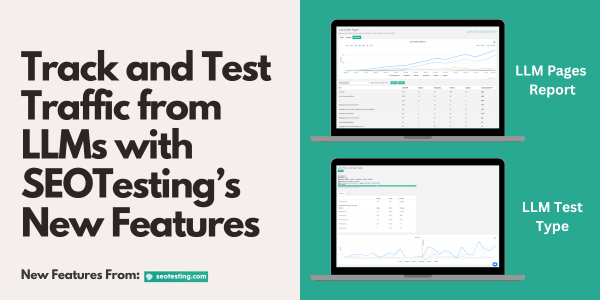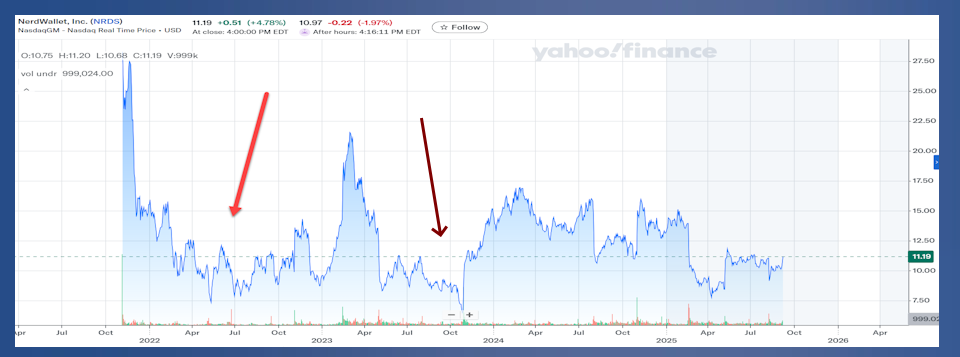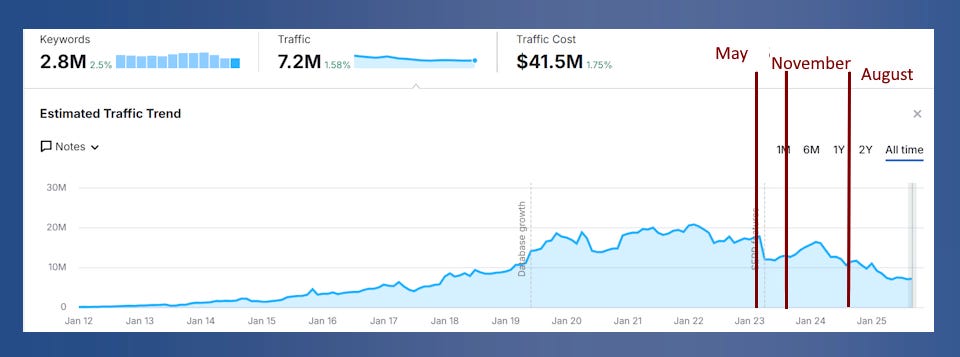Why NerdWallet Lost Me as an Investor (Hint: It’s Google)
A personal story about betting on SEO, watching Google rewrite the rules, and why I no longer trust the foundation NerdWallet’s business was built on.
This week’s #SEOForLunch is sponsored by SEOTesting.comNerdwallet IPO’d on October 27, 2021. It was the only IPO I was genuinely excited about because so much of the company’s success was built on what I know best: SEO.
As an SEO who spent a decade working both for agencies and for myself, I’ve had the chance to work directly with some of the biggest brands on the internet. That exposure gave me a front-row seat to the data and, more importantly, to how different strategies (executed at various levels) directly impacted organic search performance.
Nerdwallet “got it,” and I was willing to back up my SEO beliefs with my money.
But then Google started gaslighting us, pretending it wasn’t taking away clicks, the same clicks that help Nerdwallet succeed as a business.
As much as I believed in the company, I sold my NerdWallet stock. For one reason, and one reason only: I don’t trust Google.
Thank you to this week’s #SEOForLunch sponsorship partner, SEOTesting.com
Track and Test Your LLM Traffic!
LLMs are now real discovery channels.
With SEOTesting, you can finally quantify them. The LLM Traffic Pages Report shows you which pages attract visits from ChatGPT, Claude, Perplexity, Gemini, and Copilot, and how that changes over time. Then use our new LLM Test Type to run proper time-based tests on content or technical tweaks and measure uplift in LLM visits per day.
This is all valuable evidence that your stakeholders will trust!
Why I Supported Nerdwallet
From its early days, NerdWallet absolutely crushed SEO. They weren’t just chasing keywords, but they were investing in content the right way. Articles were well-researched, written by subject-matter experts, and backed with the kind of trust signals Google now pushes as “E-E-A-T” (Experience, Expertise, Authoritativeness, and Trustworthiness) worthy.
What stood out to me as an SEO wasn’t just the volume of content, but the discipline behind it. They understood topical authority before it became industry jargon. They created hub-and-spoke structures that made Google’s job easy. They built pages that converted instead of just chasing traffic.
(See Ross Simmonds + team article outlining Nerdwallet’s broader SEO strategy in more detail)
And most importantly, they executed consistently. While other startups were playing catch-up, focused on tricking the algorithms or burning cash on paid acquisition, NerdWallet quietly built a moat around its organic presence. As someone who has lived and breathed SEO for over a decade, I saw that as one of the purest demonstrations of long-term, compounding growth.
That’s why when NerdWallet IPO’d, I wasn’t just a casual observer; I was genuinely excited.
I believed in the business model because I believed in the SEO play.
Nerdwallet Goes Public (IPO)
NerdWallet had its IPO in November 2021. I was furious when my order didn’t get filled during the initial offering, but I got over myself and picked up shares within the next six months. Nothing crazy, no “early retirement” story money here (sorry).
I bought in around $17 a share. When the stock later dropped to the mid-$6 range in 2023, I doubled down. Everything was on fire then: political turmoil, economic concerns, the whole market sliding. I even grabbed part of a Bitcoin when it slipped under $20K. But that’s another story.
This wasn’t meant to be a quick flip. For me, NerdWallet was a long-term play. Their business was built on a search-first strategy, and I had watched them execute it perfectly.
Fast Forward: The Traffic Drop Starts
Then came May 2023. Google announced its Search Generative Experience (SGE), initially tucked away inside the Search Labs waitlist. At the time, it felt experimental, worth watching, but not an immediate threat.
That changed in March 2024 when SGE rebranded as AI Overviews and began rolling out directly in search results for everyone, no opt-in required. From that moment, the rules of the game shifted.
As the chart below shows, with each expansion of AI Overviews, NerdWallet’s organic traffic declined. Not because they did anything wrong, but because Google started keeping more of the clicks for itself.
And that’s a huge problem. NerdWallet lives and dies by its affiliate partnerships, performance-based payouts that only trigger when users take specific actions within the site.
When Google keeps more clicks, NerdWallet loses conversions, and when conversions drop, so does revenue.
Why I Sold (and why I might be wrong)
Nerdwallet CEO, Tim Chen, discussed organic search in a Q1 performance update, as Glen Allsopp reported:
“Organic search took a bit of a haircut over the past year. The two drivers, one you mentioned, which is AI overviews. The other factor is rank.”
I didn’t sell because I lost faith in NerdWallet’s team, although it was sad to see them lay off 15% of their team in August 2024. I sold because I lost faith in Google.
The business model hasn’t changed. Affiliate revenue can still be powerful when there’s a steady stream of search traffic. But the foundation it is built on? No longer reliable.
As an SEO, I’ve seen firsthand how quickly Google can rewrite the rules. With AI Overviews/AI Mode, they’re not just tweaking rankings; they’re taking away clicks entirely. And if Google is willing to cannibalize its partners once, they’ll do it again.
That’s not a bet I’m willing to keep making with my investment portfolio.
I sold all my shares at $10.XX each for a massive $500 profit.
The Bigger Lesson
This isn’t just about NerdWallet. Any company overly reliant on Google for visibility is exposed to the same risk. Publishers, review sites, even e-commerce brands… they’re all just one algorithm update or product rollout away from a major hit to traffic and revenue. That’s always been true, but with AI Overviews/AI Mode, the odds have shifted even further for businesses so reliant on search traffic.
That doesn’t mean SEO is dead, far from it. However, it does mean that business models mainly built on “borrowed land” are riskier than they appear from the outside. The more dependent a company is on Google traffic, the less control it has over its own future.
Maybe I’m Wrong?
Naturally, since I sold my shares, the stock has risen by about fifty cents. NerdWallet may continue to succeed, but I think the hill is steeper than it’s ever been.
The reality is that AI Overviews/AI mode is here to stay. And despite this post, I’m one of the rare marketers who isn’t 100% anti-AIO. If I’m being honest, I’ve found plenty of them useful for my own quick-answer searches.
But usefulness to me as a searcher isn’t the same thing as sustainability for a business model. NerdWallet lives and dies by search traffic, and Google has made it clear they’re comfortable keeping more of those clicks for themselves.
That’s why I sold. Not because I don’t believe in NerdWallet’s execution, but because I don’t trust the foundation on which their growth depends. For me, the risk/reward tradeoff shifted, and I’d rather place my bets elsewhere.






I have been following this as well but on the flip side, looking to short it. Too much of their businesses is reliant on Google and AI is eating their lunch now. Will be interesting to see if and how they can turn things around. Skeptical.
you found ai overviews useful, this increases your use of google. Hopefully this can lead to more clicks in the serps at some point.